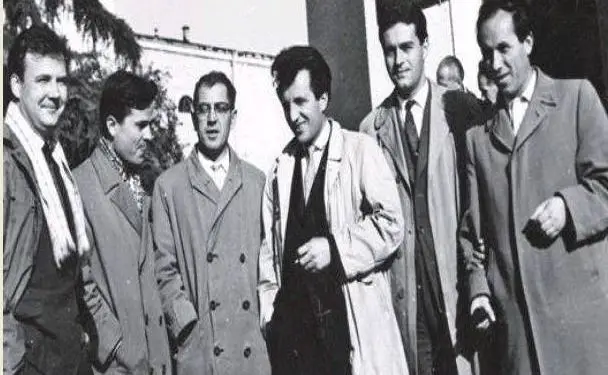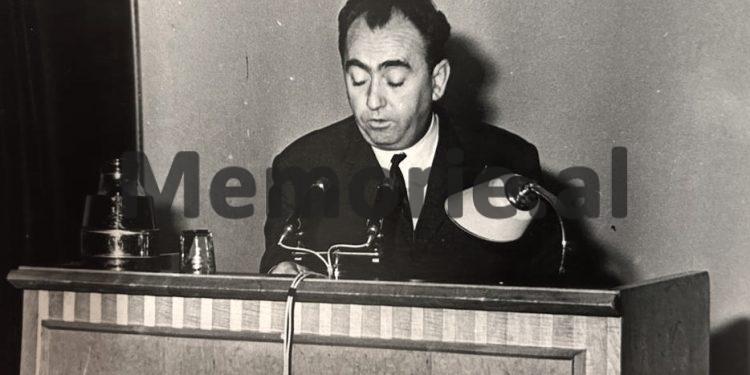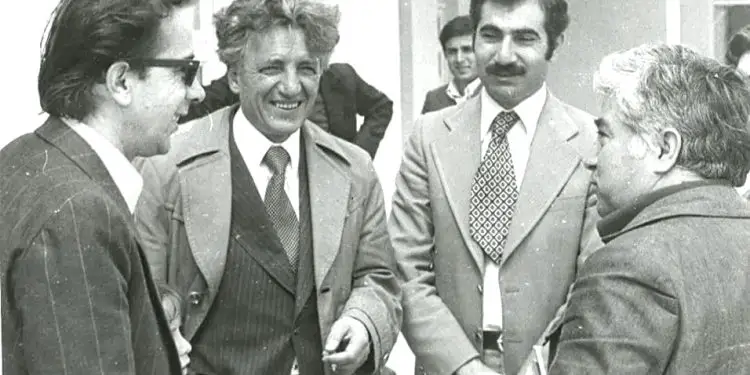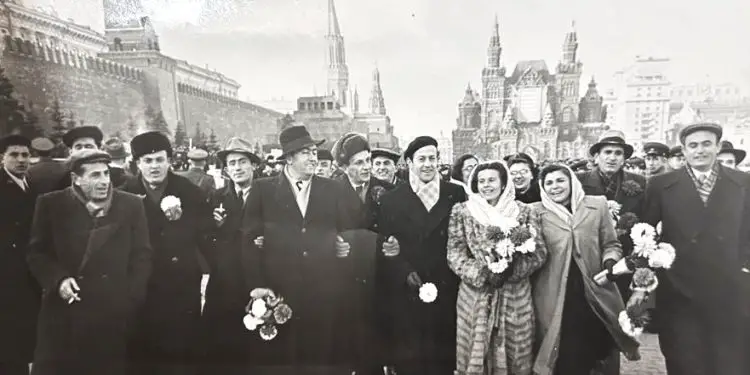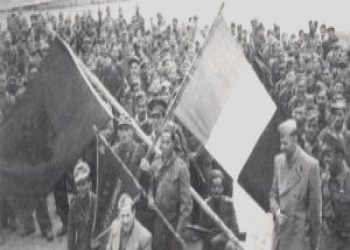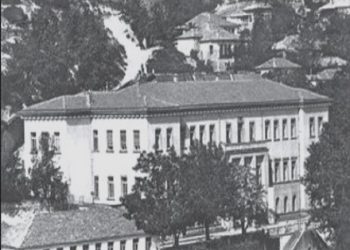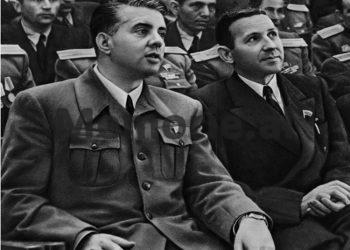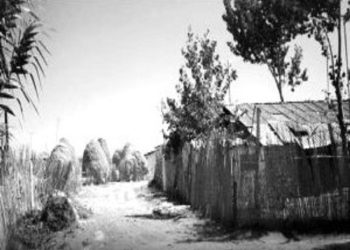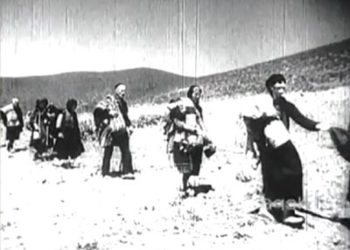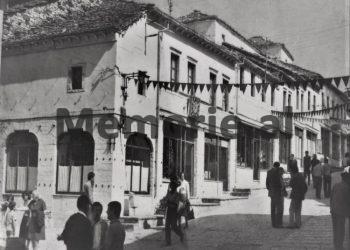By Fadil Paçrami
The twentieth part
Memorie.al / What is prison? It is the place where those who have been sentenced to deprivation of liberty are kept, we would say by reading any dictionary. But that is little. Prison and freedom – two opposites. Previously: what is freedom? In short: to be free means to do what you want, to think and act as you wish in the exercise and fulfillment of your freedoms and rights, as a person and as a citizen, but always without violating and violating others. Again: to think and act. We are talking about democratic freedoms, from those of speech, press, assembly and organization in various parties and associations, ensuring the conditions where ideas, requests and human wills can find expression and concretization, from those of the biological-related plan with the being itself, to those of the social plan, related to the ways of living.
Continues from last issue
A WRITING THAT WAS NOT PUBLISHED…!
– To the crisis of thought. If for a long time in the period of tyranny free thought was hindered, suppressed and everywhere struck – I mean mainly the field of creativity, which also consumed and barren its means of expression, now wide roads have been opened for it and bold research and discovery, which may have to give us quality literary and artistic works.
We complain about the past, we welcome the present; we rejoice in the future, let us then use these opportunities and these new conditions of free thought in democracy, with intensive work and creative persistence. The democratization of the country by opening the way to free thought and creativity without frameworks, dictates and overcontrols, create the conditions for setting creative thought in motion and enriching feelings.
– Even the intellectual crisis. Recently, there is more and more talk about the role of intellectuals, a certain attraction on their part, and the importance they have in today’s developments of the country, that is, writers, artists, etc., must be felt more strongly. The political parties call on them to participate and become active in their ranks. And the blame for this deviation that is noticed, in many cases, is put on them. I am of the opinion that the blame falls on the political parties themselves, which, instead of bringing them closer, drive them away with suspicious and cold attitudes and demands to be served, as those who serve them want. The essential thing is not being understood: many were once badly disappointed by the PP and were deeply hurt in their consciences, so they also learned lessons, so now they think about every step they take.
This too: they do not tolerate dictates from anyone. Another: they also disagree with the excesses that are noticed, often accompanied by a language full of slang and insults, on the pages of newspapers. Still: you don’t have them and they don’t come to you for demonstrations and applause – that’s why there were cries for them even during the dictatorship. I’m talking about genuine, dignified and honest intellectuals, not the so-called, pseudo, flag traders and careerists, where some writers also stand out. With a lot of culture, clarity, knowledge, tolerance and sincerity – this is what they look for and expect in their relationships. (Here he hurried, as if something had remained hostage to him, as if he was waiting for him, thinking: should I let him go or not? And he didn’t let the chance slip away.)
HE: – Regarding what you elaborated on recently, so calm laid down without milk and passions, vindictive, which many people are impressed by you political prisoners (there are exceptions, of course), I had the chance to read any of those jargons, as he called them, even in your direction. I don’t understand you, how did you stay silent?!
ME: – (laughter)
HE: – Why are you laughing?
ME: – Because you are not the first to ask me, be the last! It’s not worth it – here’s why. And when I don’t get bored, you don’t have to either. Patience and self-restraint, I deeply embedded in the prison. However, I will say two words: – Another person asked me the same question: some appreciate what you wrote, some don’t, and some go further, why so. For the former, I answered briefly: it is not up to me to speak, let’s leave it to others, let the work itself speak more precisely and clearly, if it does not speak, the others are useless. That’s it for that.
– Why did I keep silent about the second one? How to say? Yes, I also waited for others not to be silent. In addition, many have told me that they are indignant, even angry, but that’s it, until now…! Neyse, job three. There is something similar to what often happens on the streets: all kinds of thugs, commit crimes and hurt people in front of others, and they keep quiet as if they see it.
Why? Who gets away with them? This is a way to justify and protect you. But not convincing, much less acceptable. If not in one case, or only for some literary and artistic works, it happens like this. Unfortunately, so many bad and ugly things are said that disgust comes, but let all this be temporary, let reason; moral norms and the law begin to act. I am convinced that this will happen soon.
– I said: it’s not worth it. I have heard a lot, from the most serious, in the 4th Plenum of the Central Committee of PPSh, what was not invented and was not said, up to vulgarities. Some have even been published. Also during the investigation, with his hands and feet tied. Likewise in court. Even later, during the prison years. Add here also, all that they have vomited for 18 years in a row, party leaders and their nonsense in the press of the time, that if they were put into a competition, who would curse more, as can never be remembered before! That there was no need even today, this yes – there was no. Passions? Milk?
Who really needs to speak out of these? But I don’t get into this business, I’m content with: I despise and pity them. They are the same, even the same mechanisms: those of continuity and pseudos of a hundred flags. – As for any of the cases, like the one related to the discussion of the novel “Dasma”, which has been slandered, I do not hesitate to repeat that in the 60s, how many times was it about Ismail Kadare, Dritëro Agollin, Fatos Arapin, and other young people, I have always taken an open side in their support, since I was for the values of that creativity and that which they brought. I have done this even before the highest party levels, which has cost me quite a bit.
Moreover, in that case, elaborate thoughts were spoken and expressed in the “office of legends”, there in the Ministry of the Interior, which I had encountered for a long time, that is, outside of literature, as well as it was clearly attacked by old positions – that you had blacked out reality; even the extreme left. Mehmet Shehu, for a long time, was shouting loudly that in that novel the author did not even allows the peasant to open his mouth, and so on and so forth. This was the type of war at that time. For the rest, I am content with: what happened afterwards to him, who became their spokesman, let them be sought elsewhere. I’m closing here, but since you wanted to know. Maybe there was no need for these either.
(The conversation continued on other issues, from literary to political ones, and especially the latter. You have nothing to do with them – a disease of the time. We cannot avoid them, unless reason and argument prevail, otherwise we go out of time e, her requests for accurate assessments and the most optimal solutions. The conversation went on for a long time, so it was time to end it.)
HE: – And the last one, I’m sorry, didn’t I tire you?
ME: – No, continue, since you said the last thing.
HE: – I see, I overdid it…! I will ask the question without gloves, quite openly: at that time when Enver Hoxha hit you, it suddenly occurred to us why he raised that entire storm!
ME: – I was waiting for you to come out here, as you said; “the last one,” I thought. Eh, I’ve answered this question several times, that’s what happened. Something has been published. Many guesses can be made, as they have been made. I think it should be related to the time when it happened, nothing can be taken apart from what preceded and what followed”.
But, I want to stay behind on an issue that I call important. The opinion expressed that in the events of those years, there was a war of clans, as emphasized from time to time in recent times, is not correct, but malicious. Dictatorships are defined systems of rule, but the wars that take place between the tyrannies of its opponents are political, except that they are dressed in various colors, as Enver Hoxha did. He made the law in the party and the state that is known. There was also a clan struggle for power, when it comes to Koci Xoxen, Mehmet Shehu, Hysni Kapo, Kadri Hazbiu and Ramiz Ali, but not in the case and how many are on the ideological front.
(This is where our conversation ended that evening, as it got late and we parted ways. Of course we met again after a few days, but I’ll leave it at that.)
A clarification: Well it happened, he came and this conversation took place, but I may not publish these notes. To tell the truth, I was encouraged by some writings of the time, so in response to them, in this last chapter, as a closing part, in addition to what was said above, that’s why I called it: “Epilogue”!
AN INTERVIEW THAT WAS PUBLISHED
This interview was published in NR. 1 of the newspaper “D.S.N.” (Yesterday, Today, Tomorrow), in February of ’93, under the title; “Independent of parties, not of politics”!
Question: – Today’s generation of 20-25 year olds knows a period of liberalization of Albanian life, at the beginning of the 70s, under the name: “Time of the 11th Festival”. Is this term correct and did such a period exist?
Answer: – Right, the beginning of the 70s, they are known, and indeed they were a period of liberalization of Albanian life. The 11th festival was one of its culminating expressions. The term is also correct; “Albanian life”, that spirit, which was called “liberalism”, was really felt and manifested more in the fields of creativity and culture, in the intellectual layers and in the young generation, but it would be lacking, to be limited was narrowed down to those frames – as was said at that time, Ramiz Alia tries to allow it in his writings in recent times as well, efforts are made by others today.
It included the entire life of the country, extended to all spheres of political and social activity, sensitized the thinking of the most progressive forces, suppressed and suppressed for years, by the brutal Enverian dictatorship, significantly influenced the wider masses of Albanian society. . It was a nationwide revival, with anti-dictatorial and democratic tendencies. We are, therefore, in the broadest ideological, political and social plan, on a national scale and not at all in the so-called; clan war, as it has been spoken in some cases with malicious, demeaning and denying intentions.
The next question; did such a period really exist? It stems, as I understand it, from that blockade of silence and ignorance, which is observed today in certain circles, without right, and outside the historical data, towards this period, which, with speculative cries, want to erase everything even from progressive steps in the past and only know how to beat their breasts, place and place!
Question: – Can it be called as in; “spring” of Tirana?
Answer: – If you have in mind and remove a line parallel to what is known everywhere, like; “Prague Spring”, the dimensions of this are different and analogies cannot always be made. But as a trend and a spirit, they are close and the influences are indisputable. It is enough to recall the time: “Prague Spring” (in 1968) and the period of liberalization in our country (on the eve and beginning of the 70s). Keep in mind that it is a question of democratizing trends and events in two former socialist, totalitarian countries. Let’s also remember how violence worked, they were called heresy and a real danger for the monist state in power.
However, it is not for me to make the assessments for us. But let me express the opinion that: just like the “Gorbachov Phenomenon” and the whole Eastern crisis, it cannot be separated from the “Prague Spring”, the Hungarian events, those of Solidarost in Poland, the 50s with Khrushchev, not it is appropriate to explain and share – even the democratic processes of the 90s, in our country from the Tirana Conference of 1956 and all that followed, boiled and fermented in the interior, decades in a row, the beginning of the years The 70s and beyond.
Boiling points are not reached immediately, even great upheavals do not come by themselves – they are historical processes, which follow and precede, push and complement each other, appear in different ways, until they take shape and dimensions comprehensible to all and bring the turns, which mark an era. If we know this about the former Soviet Union, the former Czechoslovakia (our President of the Republic went to the Czech and Slovak Embassy weeks ago, on the occasion of Dubcek’s death, to offer condolences in his honor), in Hungary, Poland, and other countries of the East, it is necessary for us as well, as much as it was.
Question: – The European liberal spirit of the 70s, do you think it is related to the events in the East and the West, was it an awareness of the intellectuals and young people of that time, or just Enver Hoxha’s ambiguity?
Answer: – Without question it is related, it is in their spirit and continuation. Another is how, and how much. That the conditions in our country were also different: the Enverian dictatorship, which was one of the wildest, as is known, the processes of the 50s, which are located in the countries of the East, in our country were interrupted from the very beginning, the closure and isolation being extreme, violence and cunning are known as the harshest and most subtle. But all this had the opposite effect.
Intellectuals and young people felt them more, and became aware more quickly. And here I would single out the creators of letters and the arts, as well as students: the creators, as more sensitive to tyranny, oppression, dictatorship and censorship restrictions, which prevented them from expressing their thoughts, emotions and aesthetic tastes, more inclined to the ideals of freedom, human rights and democratic processes; students, traditionally known for their participation in revolutionary movements, from time to time in the vanguard of progress with the courage and dedication that distinguishes them.
As for the opinion, or simply the ambiguity of E. Hoxha (!) which I have come across for the first time in recent times – apparently, there are circles interested in this, who deliberately feed and spread it, for cast the seed of doubt as something unreal, but a contrivance of his; allow me to call it an effort and fiction as malicious as it is futile. The truth is that E. Hoxha quickly smelled it and understood the danger that was threatened by the liberal spirit with its performances at that time, evaluated it in a negative sense and hit it hard in the infamous Fourth Plenum, so he acted by giving them a contrary to developments in all areas of the country’s life, strengthened the dictatorship of the party-state, increased violence and repressive measures, further closed the gates of foreign relations and isolation, increased fear and demanded everywhere submission to the will of his orders , making the law for everything, everywhere and above everyone.
Question – Will there be more Plenums of IV?
Answer – I say no, from the form and content it had. He was a product and mirror of the dictatorship; he revealed its ferocity and its true anti-democratic face, the clearest expression of regression and cruelty, as well as the beginning of the end of that failed socialism of the Stalinist type. The years that followed were those of boundless terror, witch-hunts, oppression, isolation and corruption, which turned into a boomerang.
Now the conditions are different – the dictatorship collapsed, the people are no longer themselves, their eyes have been opened and they do not allow going back. The past is over forever. But you don’t ask that question in vain, the risks remain threatening. The nostalgic and those who lost their privileges with the overthrow of the dictatorship also suffer from the guilt complex, they yearn for that time and everything can be expected from them as well as from the hypocrites, careerists and demagogues of today who can also do what come hand in hand to satisfy their thirst for power and privilege. Therefore, the “no” I said above is not categorical.
Question – What were the relationships with friends and colleagues during your “dark” period and how are they today?
Answer – At that time: with silence – from most, with denial, – from some, few. The first ones I understand and I have excused them, the second ones have disappointed me and I am sorry. When I talk about friends and colleagues, I mean mainly those with whom my thoughts and creativity have connected me, which I still adhere to today. So I have restored the relata – I am using your expression – as before, and this is normal, long-awaited by me, and them. I always talk about my friends and colleagues. Any disappointments? Eh… these are difficult times of transition with waves, ups and downs; these are, as you know, even more unexpected. Life, periods of upheavals and even more twists, has everything.
One of these I would call – maybe it’s time to say a few words – also that as a kind of blockade, senseless silence, which I am encountering, which, to be honest, even surprises me. So strong traumatization (!), indoctrination (!) or is there any other reason (?!) For fear, at least, there should be no place anymore. It’s time to free ourselves from indoctrination. While diversity in thoughts, as well as concepts and aesthetic tastes cannot be the cause of excesses, in the conditions of pluralism there is room for everyone. But what should I call the attitude of today’s Minister of Culture and the institutions subordinate to him when, during a TV show “Transparency” in July of last year, one of the viewers asked him the question: when will he see the dramas of F. Pacram on our stages again, why is the television silent about them at least until now, what do you think and what explanations can you give us about this? he already chewed, barely got out a few slurred words and dodged such a direct question. Is this a coincidence?! Or a non-literary attitude, with political prejudices, as one of my friends and colleagues told me those days, the Minister of Culture did not speak? His work makes me so happy. Other: The League of Writers and Artists expelled me, as is known, in ’73 after the infamous Fourth Plenum; what prevented them later, after December 90 and until today, from rejecting that unjust decision? So, the Plenum of the Supreme Court rejected in August 1991 the decision that sentenced me to the deprivation of liberty and all titles, because it had no legal basis, and announced it publicly. The 10th Congress of the ALP did not have the strength, clarity and courage to reject the infamous 4th Plenum, neither did the SP later, even if it was simply based on the documentation it has (I mean the archives). and in all what life proved. How confused these affairs are! It’s not too late for me. Whoever has not been freed and suffers from prejudices, let him appeal to reason.
I say this about any of those voices that are similar to all those that I have heard for two consecutive decades after 73, so I have not answered them, since they do not deserve attention. “Things that happen. Goethe, when he talks about gossip, says that it hides a lot of malice. And his opponents – these people who will never die down and leave you alone, he divides them into several categories: first – the fools, who they do not understand and reprimand him without knowing it; the second – the envious; the third – those who themselves do nothing of value and it seems to them that others hinder them; the fourth – those who may have some reason that I am one of them , like everyone, I have my mistakes and weaknesses; the fifth – because of different opinions and points of view. This is what happens; you have nothing to do with them end: with dignity, gentlemen!
Question – Something about your life today.
Answer – In short: adhere to the opinion expressed since I got out of prison” … I prefer the independent position…. because I call it a condition for maintaining freedom of thought. But, of course, independent of parties, not from politics, about the fate of the country, so I also write from time to time and speak through the press. I spend all my time doing creative work: I have in my hands the repair and systematization of everything I wrote in prison and before, although I have not working conditions, I’m in a hurry, because I’ve already passed the seventy years and I want to finish them./Memorie.al
The next issue follows




